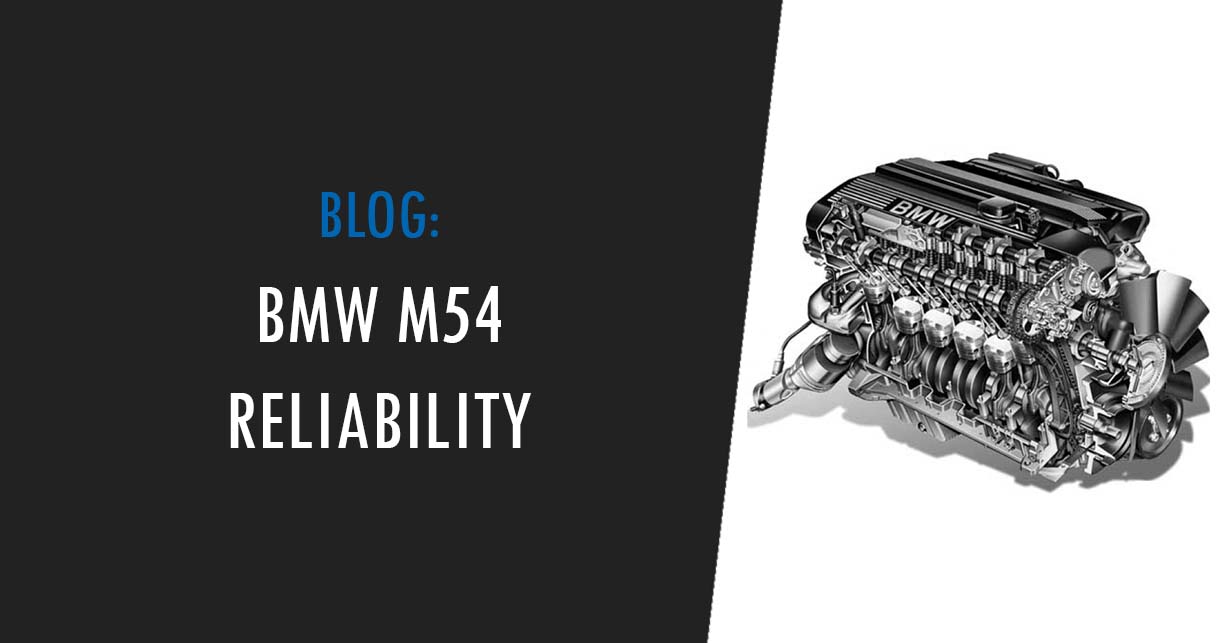The BMW M54 engine was first introduced in 2000. BMW produced the M54 until 2006 when the N52 replaced it. Improvements over the M52TU include a new aluminum block, a new intake manifold, an advanced Siemens MS 43 engine management system, a fully independent electronic throttle, and a non-fuel return system.
How reliable is the M54? In this article, we go over all you need to know about BMW M54’s reliability. If you are interested in buying an old-school straight-6 BMW, an E46 with the M54 is a perfect place to start. How will this engine fare in terms of reliability?
Is the M54 Reliable?
The BMW M54 is a reliable engine. Its simple design as a naturally-aspirated inline-6 engine contributes to its durability and straightforward maintenance. While the M54 is not completely trouble-free, it is considered one of the most reliable BMW engines, along with the N52.
It features strong internals and a sturdy engine block. In fact, it served as the foundation for the development of the venerable N54 engine, showing how overbuilt its internals are.
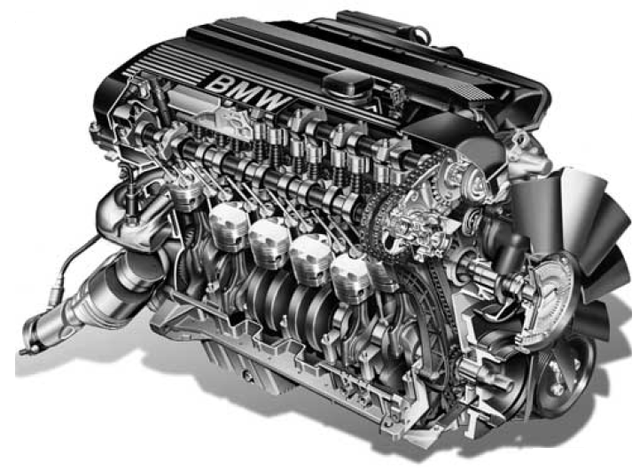
Modern BMW engines can suffer from timing chain issues, turbocharger issues, excessive rod bearing wear, and problems related to direct injection, but the M54 has none of these issues due to its simple design.
6 Most Common M54 Engine Issues:
The most common M54 problem areas include the cooling system, VANOS, oil leaks, and vacuum leaks.
1. Water Pump & Cooling System Failure
Not all parts of the M54 are built to last, and the best example of that is the cooling system which does suffer from a few distinct issues. The water pump is known to fail and so are the coolant hoses, the expansion tank, and the radiator. The cooling system is arguably the weakest part of the M54 which isn’t too big of a surprise as the M54 isn’t the only BMW straight-six with known cooling system issues.
If you want to keep your M54 car as reliable as possible it is recommended you do a complete overhaul of the entire cooling system every 100,000 miles.
Don’t drive the car if your water pump is experiencing failure systems or if the cooling system has a big leak. If the engine overheats it can be an expensive mistake.
M54 Water Pump Failure Symptoms:
- High engine temperatures.
- Fan running constantly.
- Coolant leaking from the water pump housing.
- Limp mode.
How to fix: Replace the water pump if leaking or if the water pump bearing is gritty. Refreshing the entire cooling system every 100,000 miles is a great idea for added reliability.
2. Valve Cover & Oil Filter Housing Gasket Leaks
It is no surprise that an older BMW engine may experience oil leaks. The valve cover gasket and oil filter housing gasket are the primary areas of concern in the M54. Engine gaskets harden over time and after many heat cycles, they’ll need to be replaced. This is an issue that affects nearly all BMW engines, including modern inline-6’s such as the B58.
Replacing the valve cover gasket in the M54 a relatively simple task as there are not many engine components on the way. Newer BMW engines still suffer from the same issue
The oil filter housing gasket is placed on the driver’s side of the engine and a leaking oil filter housing should be easy to spot when performing an oil change. Replacing the oil filter housing gasket is a relatively tedious task but it’s completely doable if you’re DIY-oriented.
Although oil leaks won’t affect the reliability of the M54 as soon as they appear, they should be tackled in a timely manner as leaving them unattended can cascade into other issues.
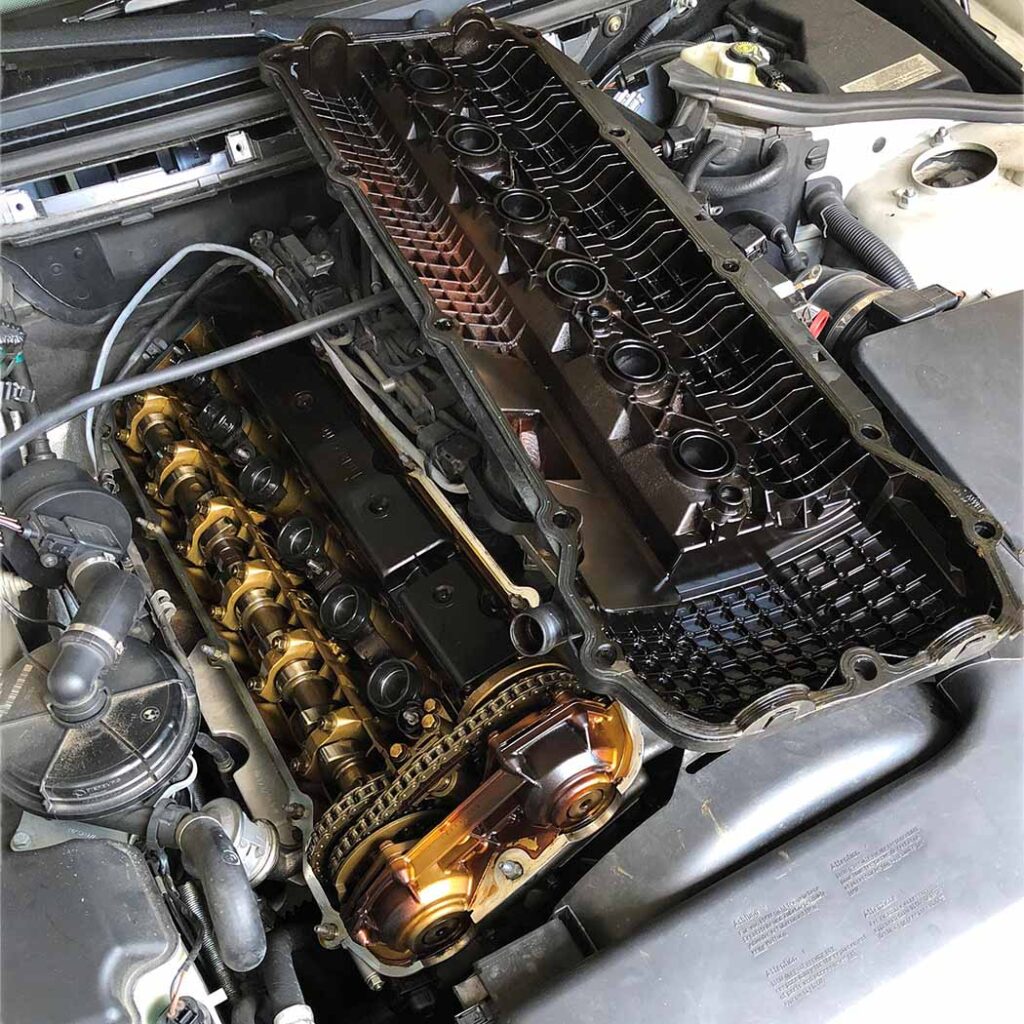
M54 Bad Valve Cover Gasket Symptoms:
- Visible oil around the side of the engine.
- Oil-burning odor inside the cabin.
- Smoke coming from the engine bay.
- Spark plugs covered in oil.
- High oil consumption.
How to fix: Replace valve cover gasket and oil filter housing gasket.
3. VANOS issues
VANOS is BMW’s variable camshaft timing system. Early VANOS systems such as the one in the M54 are known for early failure. The best way to proactively solve this issue is to replace the oil frequently, especially if you own a higher-mileage M54. Short oil change intervals are recommended to keep VANOS running smoothly.
Lots of fresh oil will keep the system functioning well for a long time, and may even save you from ever having to rebuild the VANOS.
Some M54 owners suggest replacing or rebuilding the VANOS system every 70,000-100,000 miles. Heat cycles will eventually deteriorate the seals, causing leaks and VANOS malfunctioning.
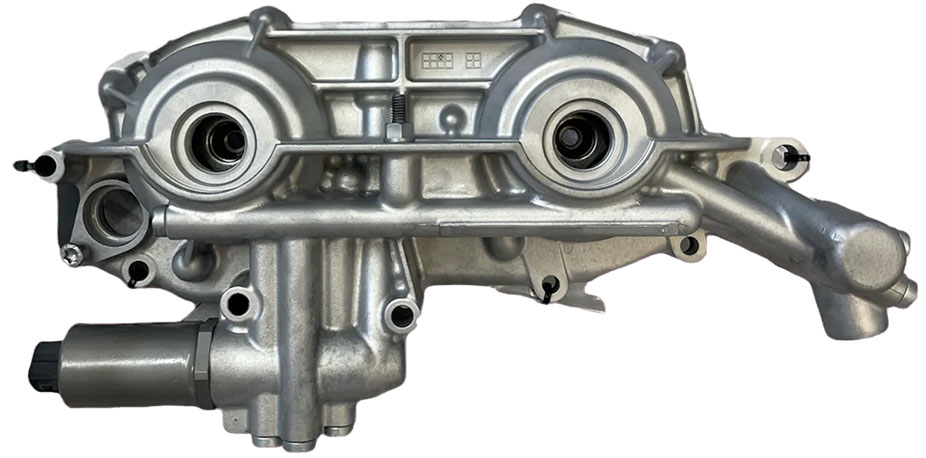
M54 VANOS Unit Failure Symptoms:
- Engine misfires.
- Lack of power.
- Check engine light.
How to fix: Replace or rebuild the VANOS unit.
4. Vacuum Leaks and Crankcase Ventilation Failure
Vacuum leaks are also typical for late 90’s BMW engines and are usually caused by deteriorated vacuum hoses. Vacuum lines are made out of plastic or rubber and deteriorate over time after being exposed to engine heat.
Identifying vacuum leaks can be challenging, but a whistling sound from the engine compartment may indicate a potential issue with vacuum lines or the crankvase ventilation system (CCV) If you notice your M54 whistling, you may need to replace the CCV or a vacuum line.
M54 Vaccum Leak and CCV Failure Symptoms:
- Rough idle.
- Whistling or hissing noises.
- Misfiring.
- Increased fuel consumption.
How to fix: Replace affected vacuum lines or rehaul the entire vacuum line system.
5. DISA Valve Failure
The DISA valves are part of the intake manifold in the M54 and are known for failing. Due to a bad choice of material, the DISA valve will wear prematurely and require replacement. Thankfully this is a part that can be replaced easily in your own driveway with just a set of Torx bits.
M54 DISA Valve Failure Symptoms:
- Poor idle.
- Reduced engine response at low RPMs.
How to fix: Remove failed DISA valve and replace with new or rebuilt unit.
6. Oil Pump Nut Backing Out
Although this problem isn’t as common as the earlier issues, we thought it would be important to mention due to its severity. On M54s that regularly see track use or racing, there is a chance of the oil pump nut becoming loose.
If the oil pump nut backs out completely, you’ll lose oil pressure. If you don’t shut off the engine on time, you may risk catastrophic engine damage.
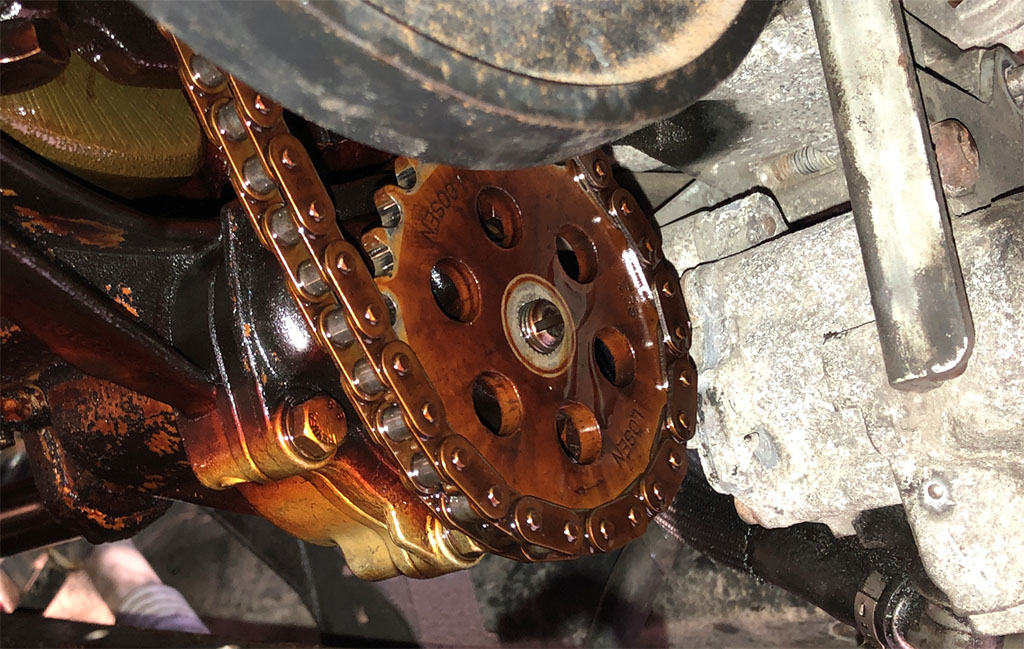
M54 Oil Pump Nut Failure Symptoms:
- Low oil pressure warning.
How to fix: Rectify the torque of the oil pump nut if the oil pan is removed. If you own a high-mileage car that has been tracked, it is recommended to remove the oil pan to verify the oil pump nut.
M54 Long-term Reliability
If you keep up with basic maintenance, there are no real reasons why your M54 shouldn’t last at least 300,000 miles. The internet is filled with M54 owners boasting about their original engine and drivetrain often lasting 300k, 400k, 500k, or even 600k miles. An M54-powered E46 3 Series is a reliable machine as long as you preventively tackle the weak areas of the M54.
Some say that the M20 is an even more reliable engine, but we can all agree that two can easily outlast any newer BMW engine, especially the early turbocharged ones.
How To Keep Your M54 Reliable
As the miles rack up, there are several things you need to keep an eye out on to keep your M54-powered BMW as reliable as possible.
1. Change the oil frequently
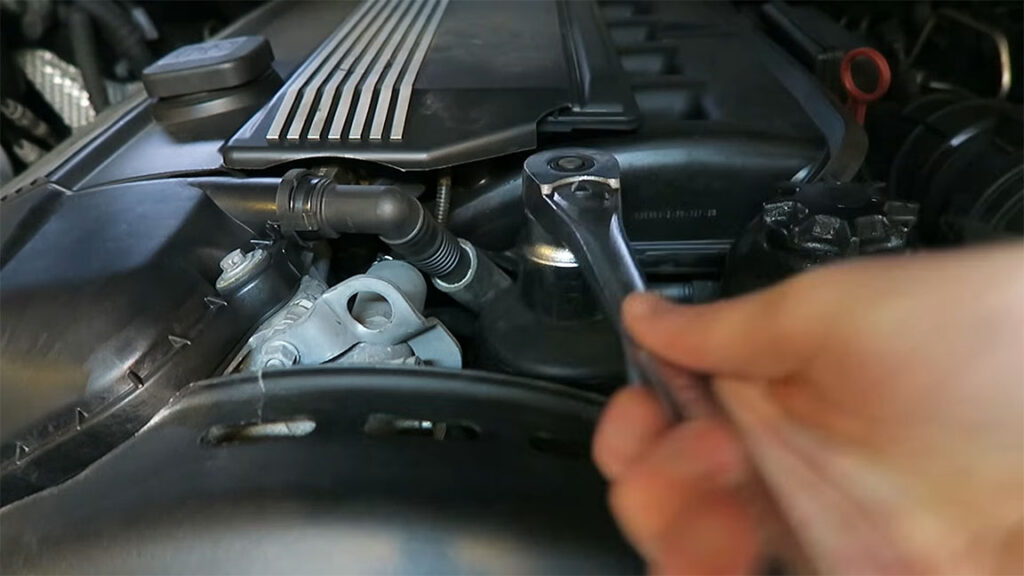
Regular oil changes, preferably every 6,000 to 8,000 miles or every year at the very minimum. Fresh oil is essential to keep the M54 running smoothly, and its VANOS system in great shape.
2. Check cooling system hoses and waterpump.
Arguably the weakest point of the M54 is its cooling system. If you notice any symptoms of cooling system failure, do not drive the car. Do not drive the car if the cooling system fails as you could overheat the engine.
All plastic hoses going to and from the radiator can become brittle, so try and replace them if you ever have to replace the radiator.
If you want to track your M54 or use it as a weekend canyon carver, you need to up your ante on engine maintenance as your engine will experience more stress than when driving around the city or during highway cruising. Be sure to keep the coolant topped off.
3. Address oil leaks promptly.
Oil leaks from the valve cover and oil filter housing gasket can not only make a mess in your engine bay but also cause secondary effects like misfiring, vacuum leaks, mixing of oil and coolant, or failure of other engine components due to the oil leak.
Moreover, the VANOS seals need to be checked at high mileage and the entire system can be rebuilt instead of replaced if necessary.
As a general rule, take proper care of the engine, let it get up to temperature before pushing it.
Closing thoughts
The BMW M54 engine was listed among Ward’s 10 Best Engines in the early 2000s, and over the years it has proven to be a reliable engine with only a few problem areas.
Now that BMW has completely stopped producing naturally aspirated engines, enthusiasts are starting to realize that the M54 is one of the most reliable BMW engines ever made. Its simplicity, naturally-aspirated inline-6 sound and very linear power delivery is something you cannot find in new BMW engines.
Some preventive maintenance will keep the M54 ticking away with no major issues and this engine will likely outlast the car itself.

